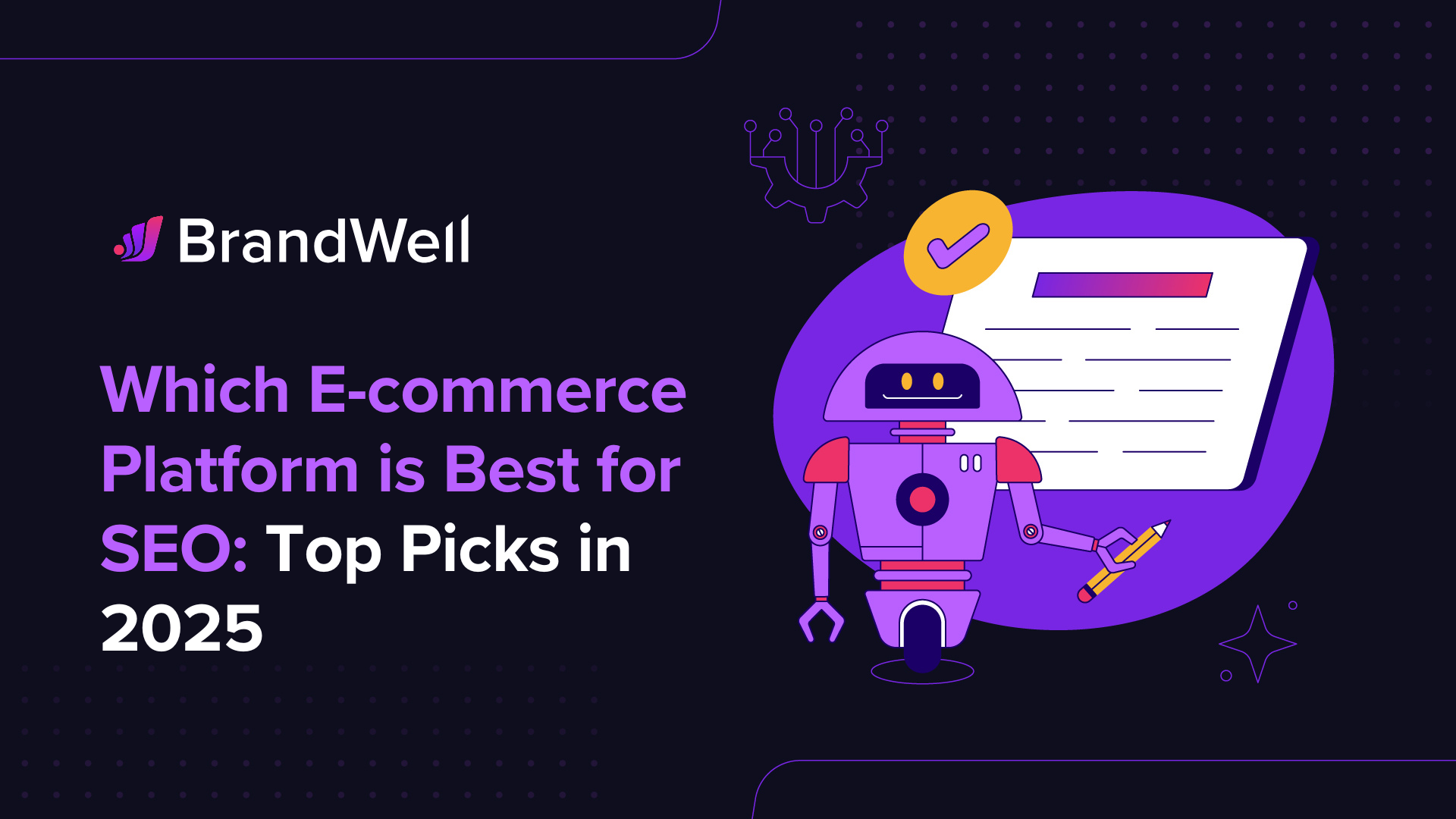Choosing the right e-commerce platform can make or break your search engine rankings.
In 2025, SEO will be more competitive than ever, with AI-driven search updates, evolving user behavior, and Google’s continued emphasis on website experience.
If you want your online store to rank high, attract organic traffic, and drive sales, selecting an SEO-friendly e-commerce platform is crucial.
In this post, we’ll compare five of the top e-commerce platforms based on their SEO capabilities, speed, mobile-friendliness, and customization options.
Table Of Contents:
- Which E-commerce Platform is Best for SEO?
- 5 Best Ecommerce Platforms for SEO
- Tips for Optimizing Your E-commerce Store’s SEO
- Measuring SEO Performance on Your E-commerce Platform
- FAQs: Which E-commerce Platform is Best for SEO
- Conclusion
Which E-commerce Platform is Best for SEO?
When it comes to choosing the best e-commerce platform for SEO, you’ve got to know what you’re looking for.
I’ve been in the retail industry for years, and I can tell you from experience that not all platforms are created equal when it comes to SEO.
First things first, let’s talk about why SEO matters for your e-commerce business.
It’s simple – if you want people to find your products, you need to rank high in search engine results.
We know that 92% of all traffic comes from Google. That’s a huge chunk of potential customers you could be missing out on if your e-commerce site isn’t optimized for search.
So what should you look for in an e-commerce platform?
- Fast Loading Speed – Google prioritizes Core Web Vitals, meaning your e-commerce store must be lightning-fast.
- Mobile Optimization – With mobile commerce dominating, a responsive and mobile-friendly design is essential.
- SEO-Friendly URLs – Clean, customizable URLs improve rankings and click-through rates.
- Schema Markup Support – Rich snippets help your products stand out in search results.
- Advanced Blogging Features – Content marketing is key for e-commerce SEO, so a strong blogging system matters.
- Built-in Technical SEO Features – Canonical tags, sitemaps, meta tags, and structured data should be easy to manage.
- Customizable Metadata – You should have full control over title tags, meta descriptions, and alt text.
- Secure and Scalable – HTTPS, reliable hosting, and the ability to scale with traffic growth are important.
These are just a few of the SEO features that can make a big difference in how well your online store ranks in search results.
5 Best Ecommerce Platforms for SEO
Ready to supercharge your online store’s search engine rankings? Here are five of my favorite platforms for e-commerce.
1. Shopify – With SEO Apps & Customization
If you’re looking for an e-commerce SEO platform that’s easy to use and packed with features, Shopify is a top choice. It’s customizable, so you can make your store look just the way you want it, and it’s designed to help you rank higher in search engines.
✅ Pros:
- Fast and mobile-optimized themes
- Excellent app ecosystem (e.g., SEO Manager, Plug In SEO)
- Easy to manage blog and content marketing
- Integrated CDN for speed
❌ Cons:
- Limited URL structure customization
- Requires apps for advanced SEO features
👉 Best For: Small to medium businesses that need an easy-to-use platform with strong SEO apps.
Built-in SEO Tools
One of the best things about Shopify is its powerful, user-friendly SEO tools. With just a few clicks, you can fine-tune your product descriptions and blog content for maximum visibility on search engines like Google.
You can customize your page titles, meta descriptions, and URLs to include your target keywords, which can help you rank higher in search results.
Shopify also generates a sitemap automatically, which is like a roadmap that helps search engines discover and index all the pages on your store.
Mobile Optimization
Want to boost sales on your e-commerce site? Shopify’s got your back with top-notch mobile optimization.
No more zooming and pinching – just a seamless shopping experience for your customers on the go.
Shopify’s themes are designed to be responsive, meaning they effortlessly adjust to fit any screen size.
Why does this matter? Mobile responsiveness can help you rank higher in search results and provide a user experience that will make your customers want to stick around and shop more.
Customizable HTML and CSS
If you really want to take your SEO to the next level, Shopify also allows you to customize your store’s HTML and CSS.
To rank higher on search engines, adjust your page’s structure, headings, and other elements for better optimization.
Of course, this does require some technical know-how, but if you’re serious about SEO, it’s worth investing the time to learn.
More tips here on how to improve Shopify SEO.
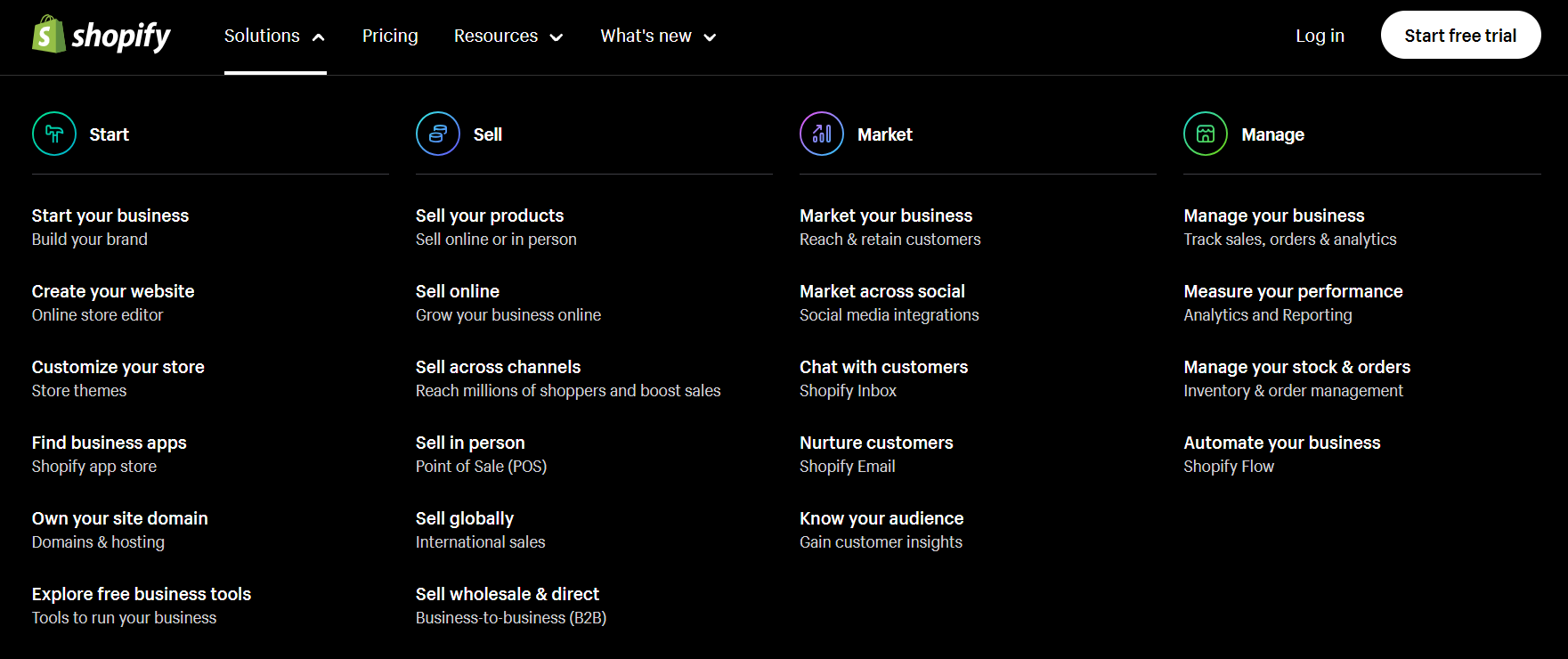
One way to significantly improve the SEO of your Shopify store is to publish a blog.
Fresh, relevant content that targets keywords related to your products or industry can attract organic traffic from search engines, improve your site’s authority, and increase opportunities for internal linking, all of which contribute to better search engine rankings and visibility for your store.
For many storeowners, blogging isn’t a priority. It’s too time-consuming and can be expensive if you have to hire outside help just to maintain your blog. But with a powerful tool like BrandWell, you can generate content around your target keywords and publish directly on your Shopify blog within minutes!
Watch how easy it is to generate bulk articles for your Shopify store using BrandWell:
To start writing Shopify blog posts using BrandWell:
Step 1: Log in to your BrandWell account, choose your project on the left column, and click the “Write New Post” button.
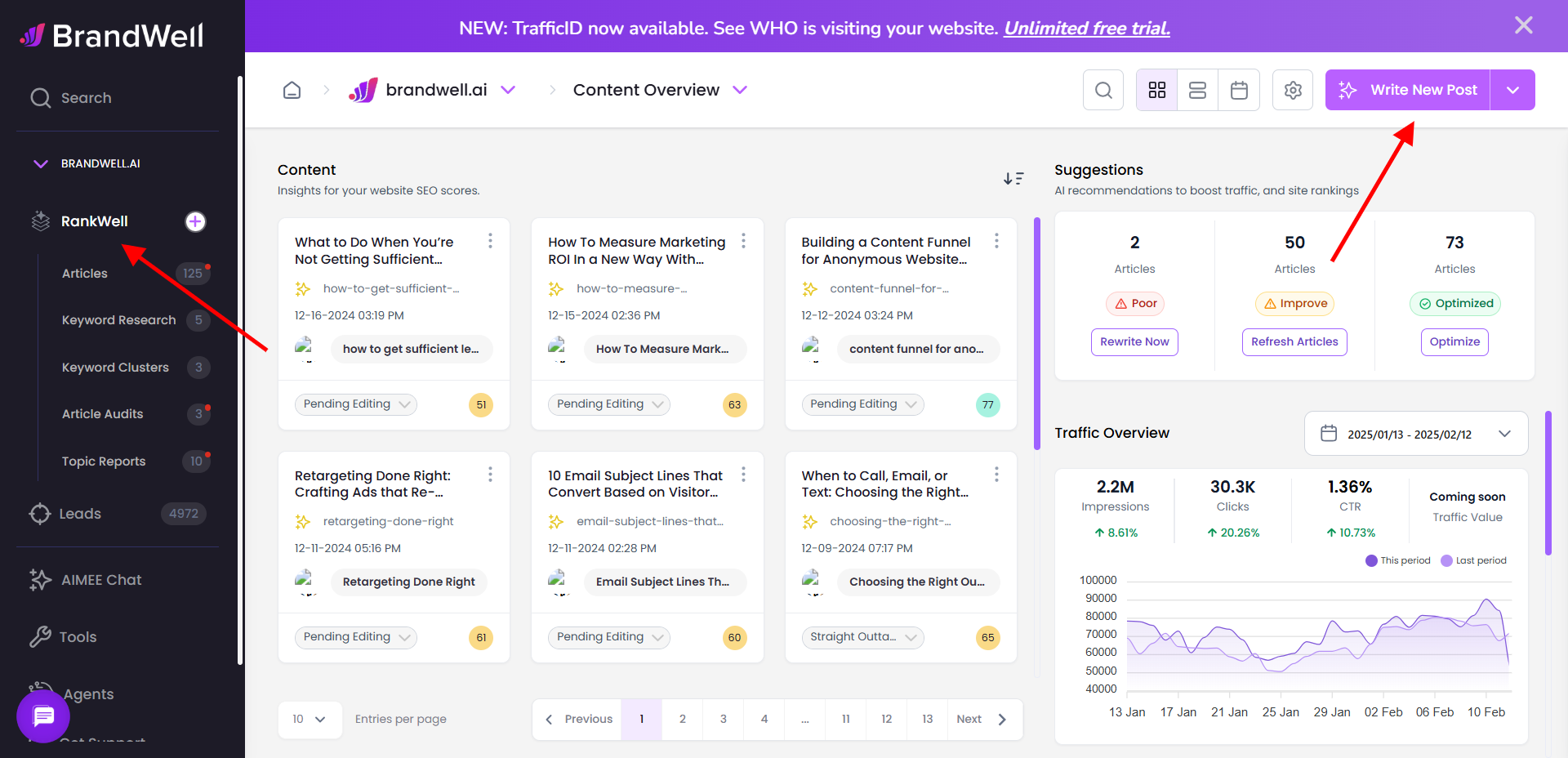
Step 2: Choose your article source. BrandWell allows you to generate blog posts from a keyword, a YouTube video, a podcast episode, or a digital file.
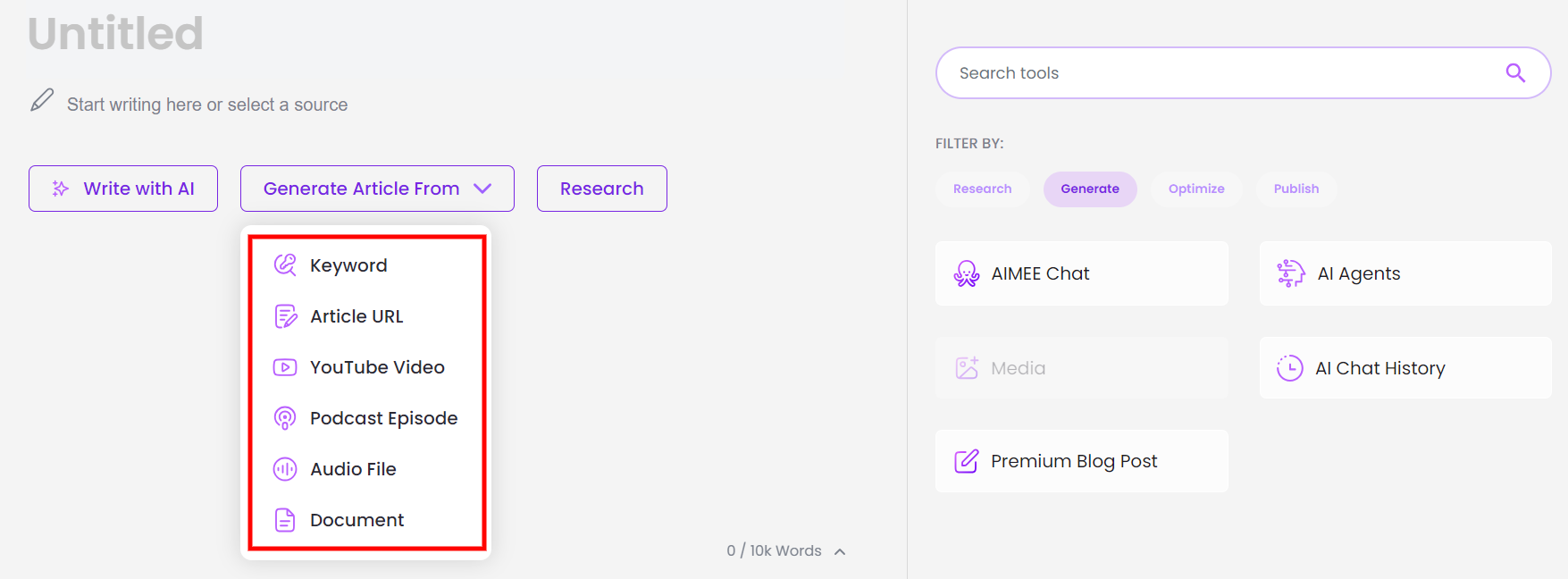
Step 3: Enter the keyword you want to rank for or the URL of the content you want to repurpose, then click “Write Article Now.”
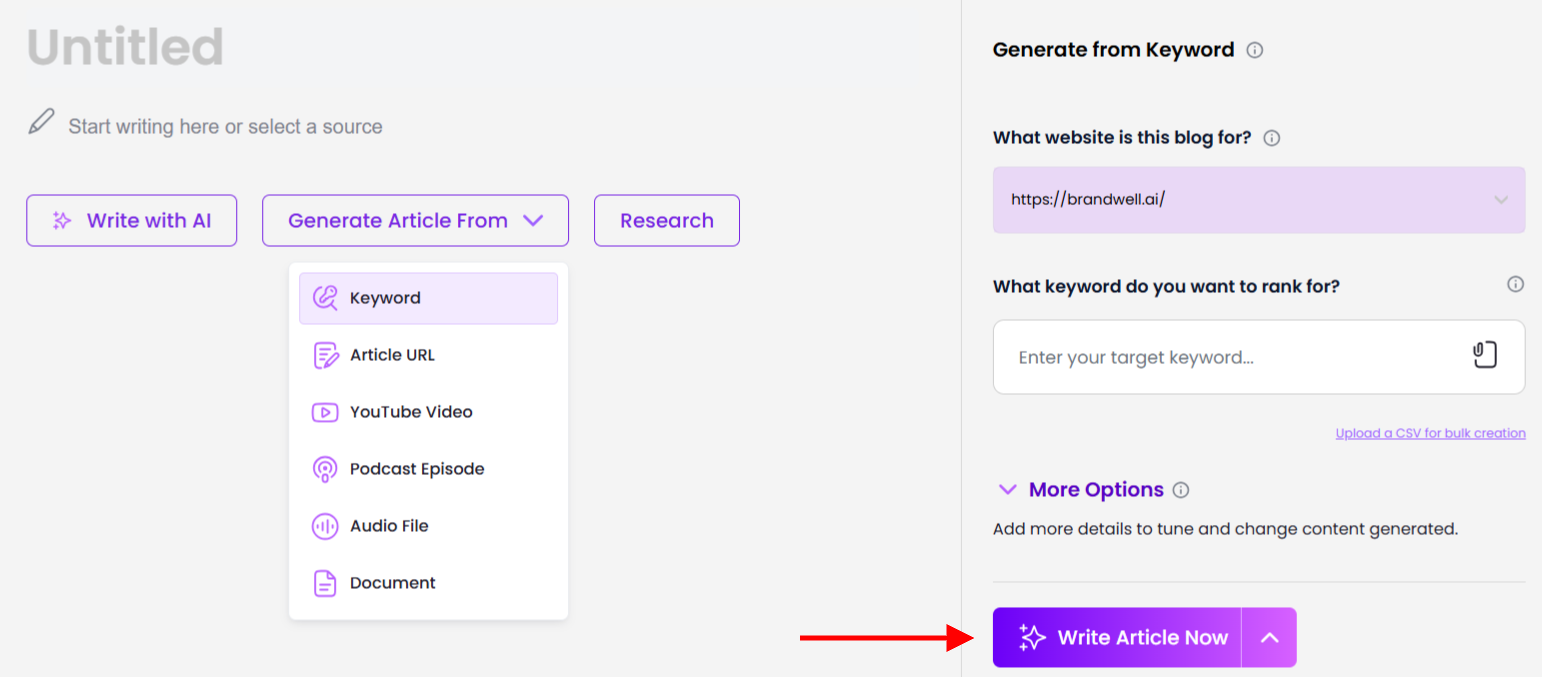
While BrandWell is writing your article, go to the Project Settings to activate the Shopify plugin. This will sync BrandWell with your Shopify account so you can instantly publish your blog post without leaving the BrandWell app.
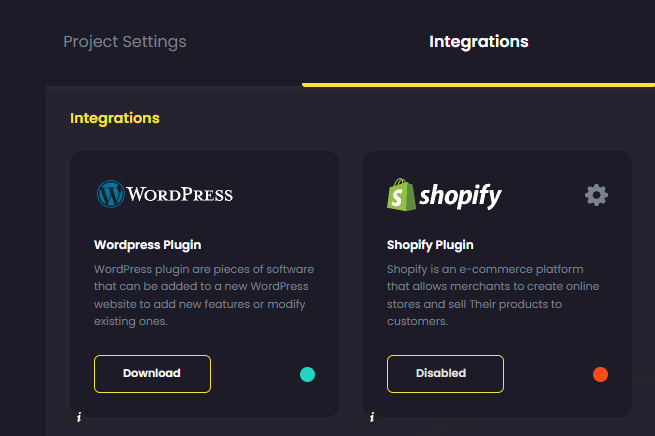
2. WooCommerce – Best for Custom SEO Control
If you’re looking for an e-commerce platform that seamlessly integrates with your WordPress site, look no further than WooCommerce. This open-source plugin is a top choice for those on a budget who still want impressive SEO features.
✅ Pros:
- Full control over SEO (since it’s built on WordPress)
- Best blogging capabilities for content-driven SEO
- SEO plugins like Yoast and Rank Math
- Customizable URL structure and metadata
❌ Cons:
- Can be slow if not optimized properly
- Requires manual setup for speed and security
👉 Best For: Businesses focused on content marketing and organic traffic growth.
Extensive SEO Settings
WooCommerce’s SEO settings are a game-changer for your online store. Imagine being able to craft the perfect page titles, meta descriptions, and URLs for every product, category, and tag. That’s the level of optimization that can give you a competitive edge in search rankings.
Tweaking your store’s SEO settings can work wonders for your organic traffic and search engine rankings. Spend some time crafting irresistible, keyword-rich titles and descriptions that’ll have qualified leads flocking to your virtual doorstep.
Blogging Functionality
Another reason WooCommerce is a top pick for SEO is its built-in blogging functionality.
Content marketing is crucial for driving organic traffic, engaging your audience, and establishing your brand as an authority. With WooCommerce, you can easily publish SEO-optimized content right from your store.
Blogging is an incredible way to demonstrate your knowledge and promote your products. I constantly encourage my clients to leverage this feature by crafting valuable, informative blog posts.
By regularly publishing content that truly shines, you can organically attract inbound links and social media shares.
The end result? A growing customer base that can’t wait to see what you’ll share next.
Wide Range of SEO Plugins
As a WordPress-based ecommerce platform, WooCommerce benefits from a vast ecosystem of SEO plugins. Popular options like Yoast SEO and All in One SEO Pack offer additional tools and features to optimize your store even further.
Generating XML sitemaps, setting up breadcrumbs, and optimizing images for search engines is a breeze with these plugins. You’ll have plenty of choices to tweak your WooCommerce store’s SEO until it’s just right.
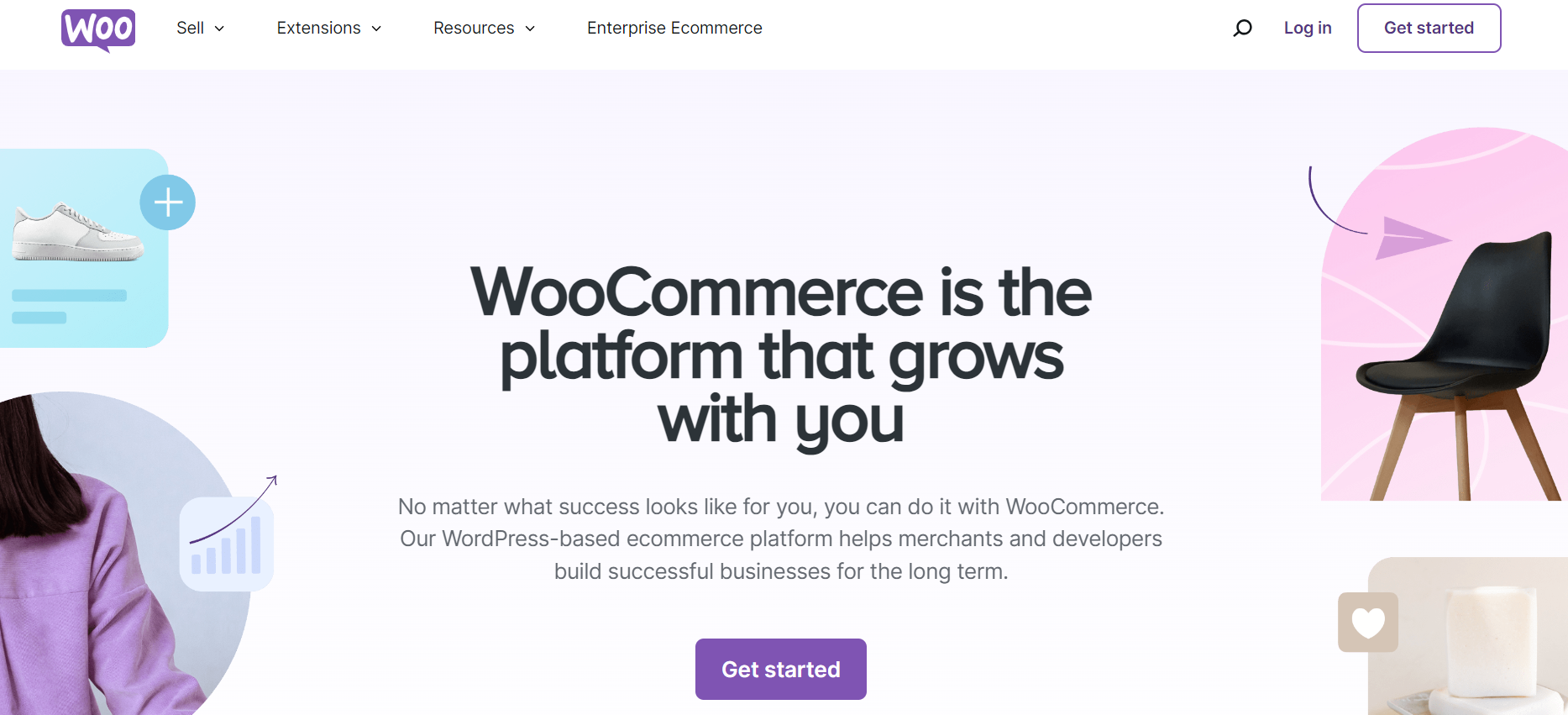
3. Adobe Commerce (Magento) – Best for Enterprise-Level SEO
For enterprise-level businesses, Adobe Commerce (formerly Magento) is the unrivaled choice for e-commerce SEO. Its robust feature set and customization options make it a powerhouse for online stores.
✅ Pros:
- Full customization for technical SEO
- Advanced schema markup capabilities
- Scalability for large e-commerce businesses
- Supports multilingual SEO
❌ Cons:
- Requires development knowledge
- Expensive hosting and maintenance
👉 Best For: Large businesses and enterprises with dedicated SEO teams.
Advanced SEO Capabilities
Adobe Commerce offers advanced SEO capabilities that give you unparalleled control over your store’s optimization. From customizable URLs and meta tags to canonical tags, you can fine-tune every aspect of your on-page SEO.
One of my favorite features is the ability to set custom rules for product and category pages. This allows you to create dynamic meta descriptions and optimize your site structure for both users and search engines.
Duplicate Content Management
Duplicate content can be a major issue for e-commerce stores with hundreds, if not thousands, of products. Adobe Commerce has built-in tools to manage this.
With canonical tags and meta robots tags, you can ensure search engines only index the most relevant pages, avoiding any potential penalties.
I’ve worked with clients who saw significant improvements in their search rankings after implementing these duplicate content management strategies. It’s a critical aspect of e-commerce SEO that Adobe handles exceptionally well.
Flexible URL Structure
One of the coolest things about Adobe Commerce is how it lets you take control of your URL game. You can whip up search engine-friendly URLs for your products, categories, and CMS pages like a pro. This not only gets you bonus points with search engines but also makes navigating your site a breeze for users.
Want to give your website’s SEO a boost while making navigation a snap for your customers? Descriptive, keyword-rich URLs are the way to go. With Adobe Commerce, implementing this winning strategy is a piece of cake.

3. BigCommerce – Built-in SEO Features
Want an ecommerce platform that’s optimized for both speed and SEO? Look no further than BigCommerce.
This powerful tool has helped countless businesses, from mom-and-pop shops to big-name brands, expand their online reach and grow their bottom line.
BigCommerce knows how crucial site speed is for your online store’s success. A sluggish site can quickly turn off potential customers and send them running to your competitors. But with BigCommerce’s speedy performance, you can keep shoppers engaged and ready to buy.
✅ Pros:
- Automatic image optimization and schema markup
- Fast-loading themes and strong Core Web Vitals performance
- No transaction fees on higher plans
- Supports multi-channel selling
❌ Cons:
- Fewer SEO plugin options compared to Shopify and WooCommerce
- Learning curve for beginners
👉 Best For: Medium to large businesses that want built-in SEO tools without relying on third-party apps.
Optimized Site Speed
BigCommerce is known for its fast-loading stores, with optimized server response times and content delivery networks (CDNs) to ensure quick page load speeds. This is a crucial factor for both SEO and user experience.
When you’re pouring your heart and soul into growing your online business, the last thing you want is a sluggish website. Akamai’s research shows that even a 100-millisecond delay can lead to a 7% drop in conversions.
That’s a significant hit to your bottom line.
Built-in SEO Features
But speed isn’t the only thing BigCommerce has going for it when it comes to SEO. The platform also offers a range of built-in SEO features that make it easy to optimize your store for search engines.
You can customize your page titles, meta descriptions, and URLs to include your target keywords. Plus, BigCommerce automatically generates sitemaps and allows you to create 301 redirects, which are essential for maintaining your SEO rankings when you make changes to your site.
Responsive Design
Another key feature of BigCommerce is its responsive design. All BigCommerce themes are mobile-responsive, ensuring that your store looks great and functions well on any device.
This is essential for both user experience and SEO, as Google now uses mobile-first indexing to rank websites. If your site isn’t optimized for mobile, you could be missing out on valuable traffic and sales.
As someone who’s worked with countless e-commerce businesses, I can tell you that having a platform with built-in SEO tools and a focus on speed and mobile optimization can make a huge difference in your online success.
BigCommerce makes SEO simple. You can leave the complex optimization tasks to the e-commerce platform and dedicate your time to growing your customer base and offering them an unforgettable shopping experience.
With BigCommerce, achieving strong search engine rankings is easier than ever.
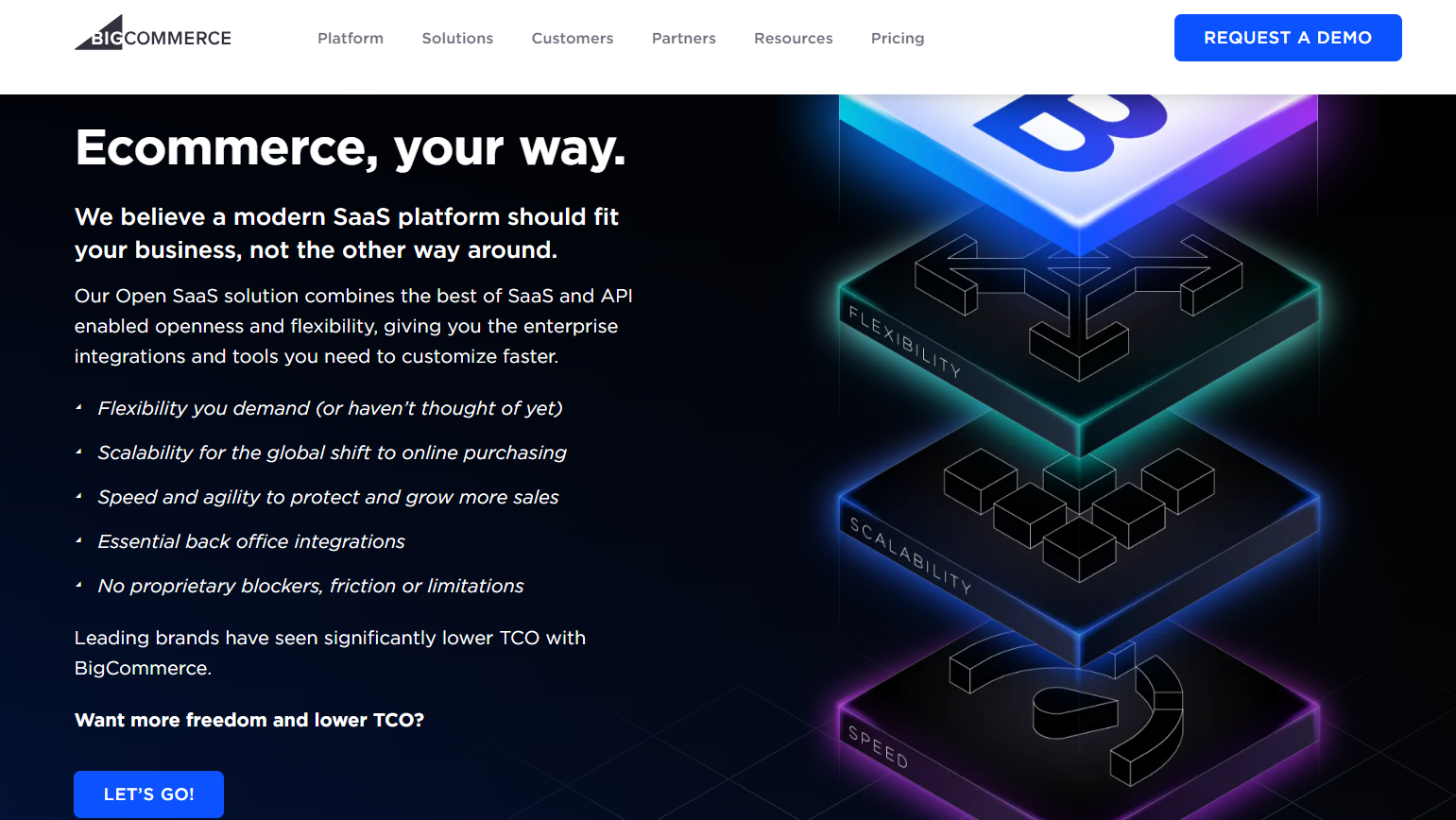
5. Wix eCommerce – Beginner-Friendly SEO
Now, I know what some of you might be thinking. Wix? Isn’t that just for small businesses and personal websites?
Well, think again. Wix has come a long way in recent years, and it’s now a serious contender in the world of ecommerce platforms.
Creating a professional online store has never been easier, thanks to Wix’s user-friendly platform. With zero coding or design skills required, you can dive right in and start building your dream store.
Simply choose from their extensive library of customizable templates, and use the intuitive drag-and-drop interface to make it your own.
✅ Pros:
- Simple SEO tools and structured data
- Easy on-page SEO customization
- Faster than previous years with improved performance updates
❌ Cons:
- Limited control over technical SEO
- URL structure is not as customizable as WooCommerce or Magento
👉 Best For: Small businesses or solopreneurs who want an easy-to-use platform with basic SEO features.
Beginner-Friendly SEO Settings
But what about SEO? Can a platform that’s so easy to use really be good for search engine optimization?
The answer is a resounding yes.
With Wix, you don’t need to be a coding whiz to get your store ranking high on search engines. Their user-friendly SEO settings make it a breeze to customize your page titles, meta descriptions, and header tags, so you can focus on growing your business.
Don’t sweat the small stuff – Wix has your back. They’ll generate a sitemap for your store and make sure Google knows all about it.
SEO Wiz Tool
Want to get your website noticed by search engines? Wix’s SEO Wiz is here to help. This nifty tool provides a step-by-step guide to optimizing your site, complete with personalized recommendations based on your unique business information and chosen keywords.
I’ve used the SEO Wiz tool with clients who were new to e-commerce, and it really helped them get their sites ranking well in search results without a lot of technical know-how.
Mobile-Friendly Templates
Wix’s mobile-friendly templates make it a breeze to build an online store that looks stunning on smartphones and tablets. In today’s world, where more and more shoppers are browsing on their phones, having a mobile-optimized site is essential for delivering a top-notch user experience and boosting your SEO rankings.
Wix’s templates are designed with mobile in mind, so you don’t have to worry about your site looking wonky or being hard to navigate on a small screen.
Wix has seriously impressed me with its user-friendly interface and stellar SEO capabilities. It’s the perfect fit for businesses taking their first steps into e-commerce – easy enough for beginners to navigate, yet equipped with the powerful SEO features you need to succeed.
Growing your business has never been easier thanks to Wix’s extensive collection of apps and integrations. With the ability to seamlessly add email marketing, social media integration, and other powerful features, you’ll be able to connect with new customers and keep them coming back for more.
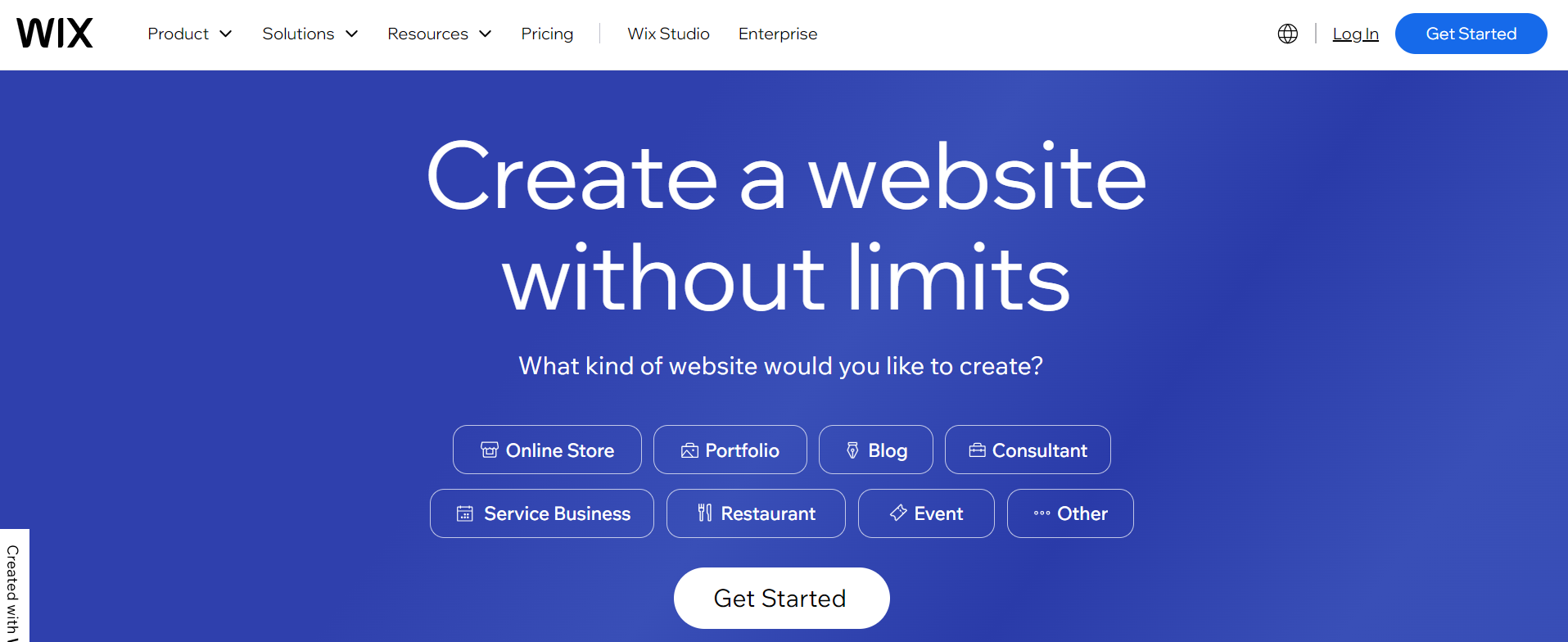
Each platform has its strengths, but WooCommerce and BigCommerce stand out in 2025 for their balance of flexibility and SEO power. Shopify remains a strong contender, especially with the right SEO plugins.
Tips for Optimizing Your E-commerce Store’s SEO
Alright, so you’ve vetted our top e-commerce platforms and are ready to take your e-commerce store’s SEO to the next level.
Here are some tips and tricks I’ve learned over the years to really boost your online visibility and drive more organic traffic:
Improve Site Speed
I cannot stress enough the importance of site speed in SEO. Google wants to show the best websites to its users, and a site that loads fast is a good sign it’s high-quality. Even a one-second delay can hurt your revenue, so it’s worth investing time to speed up your site.
Some ways to improve your e-commerce site’s speed include optimizing images, minimizing redirects, and leveraging browser caching. Trust me, even small improvements in site speed can make a big difference in your search engine rankings.
Create Quality Content
Content is king when it comes to SEO. By creating high-quality, valuable content that resonates with your target audience, you’ll naturally attract more backlinks and social shares — two key factors in boosting your search engine rankings.
With BrandWell, you can create product descriptions that captivate, blog posts that inform, and product guides that truly help. The more value and engagement your content brings, the higher it will soar in search rankings.
Here’s an example:
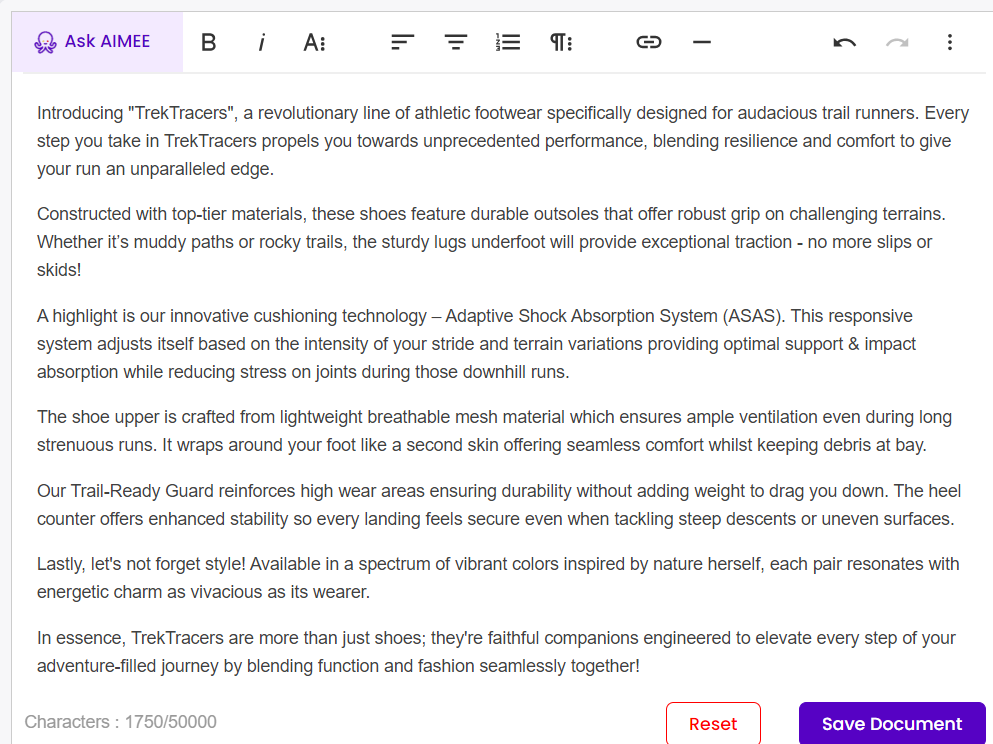
Want more tips on how to create content for your e-commerce store? Check out these winning e-commerce content marketing strategies.
Optimize for Mobile
With more and more people shopping on their smartphones, Google has switched to mobile-first indexing — meaning its bots primarily use the mobile version of your site for ranking purposes.
Make sure your ecommerce platform is responsive and optimized for smaller screens. This includes having easy-to-click buttons, readable text, and fast-loading pages.
Structure URLs
Pay attention to your URLs. A clear, logical structure helps search engines grasp your site’s layout and allows users to navigate with ease.
Aim for short, descriptive URLs that include your target keywords, and avoid excessive parameters and numbers whenever possible.
By following these tips, you’ll be well on your way to driving more organic traffic and sales for your e-commerce store. It takes time and effort, but trust me — the payoff is worth it.
Measuring SEO Performance on Your E-commerce Platform
You’ve put in the work to optimize your e-commerce site for search engines. But how do you know if it’s actually paying off? That’s where measuring your SEO performance comes in.
And let me tell you, tracking your SEO progress is crucial. It’s the only way to know if your efforts are moving the needle and driving more organic traffic to your online store.
Set Up Google Analytics
First things first, you need to set up Google Analytics on your e-commerce SEO platform. This powerful tool gives you valuable insights into your website’s traffic, user behavior, and conversions.
I remember when I first started with Google Analytics — it was a game-changer. Suddenly, I had access to a wealth of data that helped me make informed decisions about my SEO strategy.
Track Key SEO Metrics
Once you’ve got Google Analytics up and running, it’s time to start tracking those key SEO metrics. Some important ones to keep an eye on include:
- Organic traffic
- Keyword rankings
- Bounce rate
- Pages per session
- Average session duration
Want to know if your SEO strategy is working? Look at your e-commerce site’s metrics. Increased traffic from search engines and engaged visitors are clear signs you’re on the right track.
Monitor Search Engine Rankings
You can’t afford to ignore your search engine rankings when assessing your SEO strategy. A top spot on the results page is a surefire way to boost organic traffic.
If you want to know how well your SEO efforts are paying off, you’ve got to keep a close eye on where you rank for relevant keywords. It’s the most effective way to see what’s working and what needs improvement so you can make informed decisions going forward.
FAQs: Which E-commerce Platform is Best for SEO
Which e-commerce platform is best for SEO?
The best e-commerce platform for SEO in 2025 is WooCommerce due to its full control over SEO settings, customizable URLs, and strong blogging capabilities. BigCommerce is another top choice for built-in SEO features like structured data and fast-loading themes. Shopify is also a solid option when paired with SEO plugins.
Which platform has the best SEO?
WooCommerce and BigCommerce offer the best SEO capabilities. WooCommerce allows full customization and integrates with powerful SEO plugins like Yoast and Rank Math. BigCommerce has built-in SEO features, including automatic schema markup and optimized site speed, making it a strong contender.
What is the best SEO strategy for e-commerce?
The best e-commerce SEO strategy includes:
- Improving site speed and Core Web Vitals to enhance user experience.
- Using keyword research to target product-driven and long-tail keywords.
- Creating high-quality content such as blogs and buying guides.
- Implementing schema markup to boost product visibility in search results.
- Building internal links to improve navigation and SEO structure.
- Acquiring high-quality backlinks from authoritative websites.
- Optimizing product pages with SEO-friendly URLs, meta descriptions, and alt text.
- Ensuring mobile optimization for a seamless shopping experience.
Which type of website is best for SEO?
The best websites for SEO are fast-loading, mobile-friendly, and content-rich. For e-commerce, WooCommerce on WordPress is the best for content-driven SEO, while BigCommerce and Shopify provide strong technical SEO features. Websites with a clear structure, high-quality content, and optimized performance tend to rank higher on Google.
Conclusion
So which e-commerce platform is best for SEO?
The best e-commerce platform for SEO offers the perfect balance of built-in features, customization options, and user-friendliness.
You might be tempted by Shopify’s turnkey solution, WooCommerce’s versatility, or Magento’s advanced options. But here’s the deal – none of that matters if you don’t prioritize search engine optimization for your online store.
Take the time to dive into your e-commerce platform’s SEO features and create content that captivates your audience. Keep a close eye on your online store’s performance, and with the right strategy in place, you’ll be well on your way to climbing the search rankings and attracting a flood of eager shoppers.

